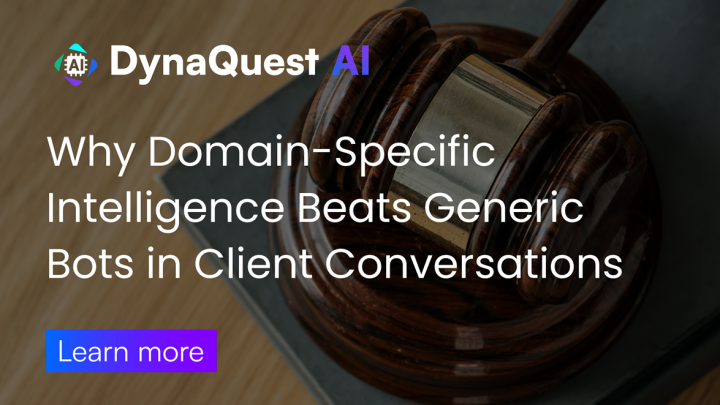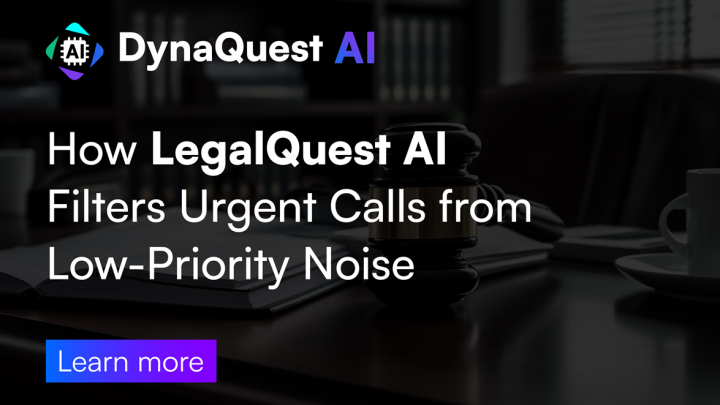AI with Legal Sense: Why Domain-Specific Intelligence Beats Generic Bots in Client Conversations
1. Introduction: Why LegalTalk Demands Legal Intelligence Generic chatbots are great for FAQs and small talk. But in law—where every word holds weight—a wrong response isn’t just unhelpful, it can be harmful. LegalQuest AI is built specifically for lawyers, with legal domain intelligence that generic bots simply lack. 2. The Hallucination Problem in Legal AI A Stanford HAI study revealed that general-purpose AI models hallucinate (fabricate false information) in at least 1 in 6 legal queries.¹ In contrast, domain-trained legal models significantly reduce these errors. In law, mistakes aren’t acceptable. Precision is mandatory. 3. Why Generic Bots Fall Short Generic bots: Legal intake isn’t a customer service ticket—it’s the start of a legal duty. 4. What LegalQuest AI Gets Right LegalQuest AI is trained specifically on legal use cases to: 5. Table: Generic Bot vs. LegalQuest AI in Intake Scenarios Scenario Generic Chatbot Response LegalQuest AI Response “I have a court date tomorrow.” “Contact us.” Flags urgency, logs context, offers callback “Can I sue?” “Maybe, please call us.” Responds with compliant explanation and invites intake appointment “My spouse is threatening me.” “Someone will reach out.” Flags domestic violence risk, triggers escalation workflow “What does a retainer cost?” “Prices vary, call office.” Offers ballpark figure and explains standard billing processes Mentions ongoing mediation “We’ll get back to you.” Categorizes as family law, logs for appropriate follow-up 6. How It Earns Trust Before You Even Speak LegalQuest AI delivers accurate, compliant, and empathetic replies that immediately build trust. Speed alone doesn’t cut it—precision and context matter in client conversations. 7. Protecting Your Integrity and Liability AI hallucinations can lead to malpractice, ethics violations, or regulatory exposure. LegalQuest AI is engineered to eliminate these risks and support your practice’s integrity. 8. Smart Triage = Smarter Workflow LegalQuest AI doesn’t just capture information—it categorizes by urgency and practice area, structuring your intake pipeline so that human follow-ups are faster, cleaner, and more consistent. 9. Designed for Legal Professionals Easily configure: No coding. No vendor lock-in. Just tech that thinks like a legal professional. 10. Conclusion: Speak Law Fluently—Not Functionally Generic bots can talk. LegalQuest AI listens, understands, complies, and supports your practice with legal intelligence. When intake matters, choose AI that’s fluent in your field. 🔧 FAQs Does LegalQuest AI ever give unauthorized legal advice?No. It’s designed to provide compliant, factual responses only. How does the AI detect urgency or risk?It uses domain-trained intent models and risk detection logic tuned to legal workflows. Can it handle multiple practice areas at once?Yes. LegalQuest AI routes intake based on detected legal domain and urgency. Will clients know it’s AI?It sounds natural and empathetic—you decide whether to disclose that it’s automated. How secure is the intake data?All interactions are secured and privacy-compliant with standards like HIPAA, GDPR, and ABA confidentiality rules. Reference ¹ Stanford HAI. “AI on Trial: Legal Models Hallucinate in 1 Out of 6 (or More) Benchmarking Queries.”https://hai.stanford.edu/news/ai-trial-legal-models-hallucinate-1-out-6-or-more-benchmarking-queries









